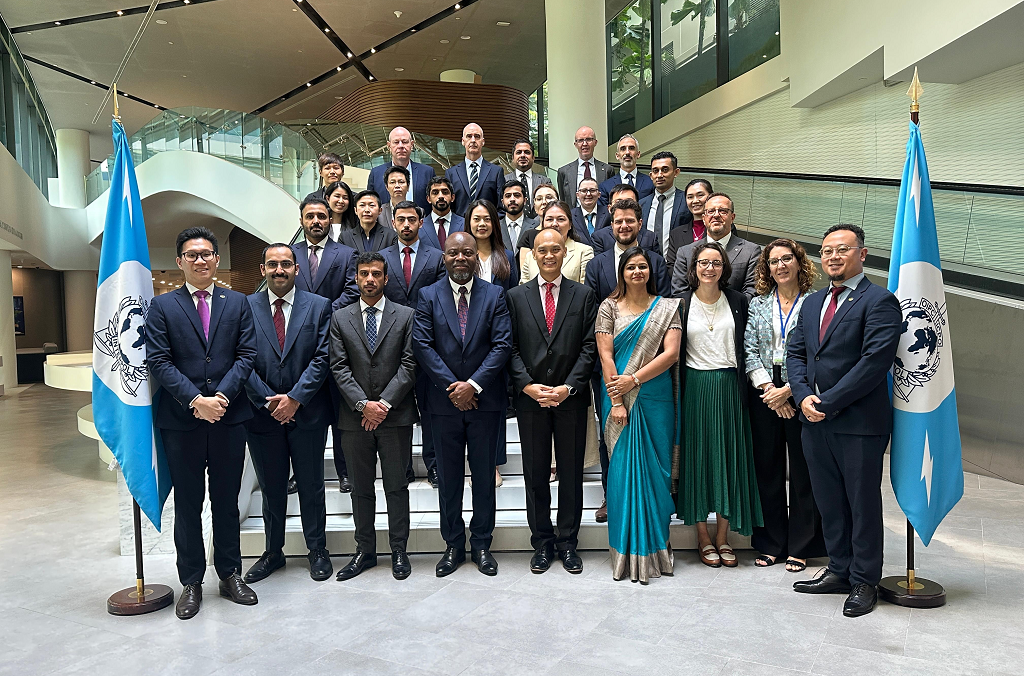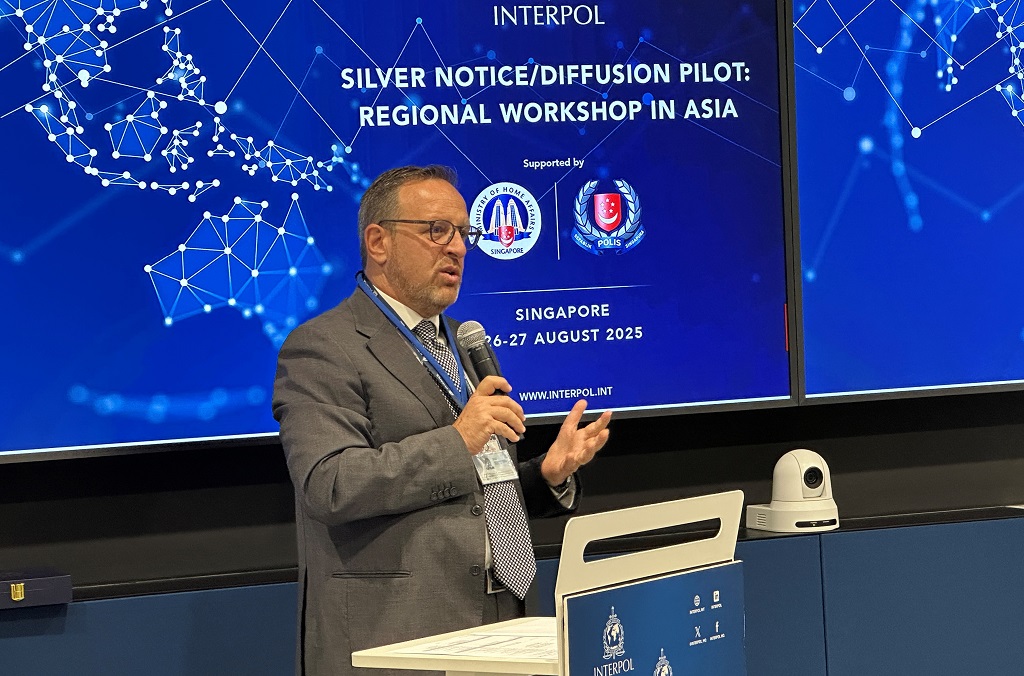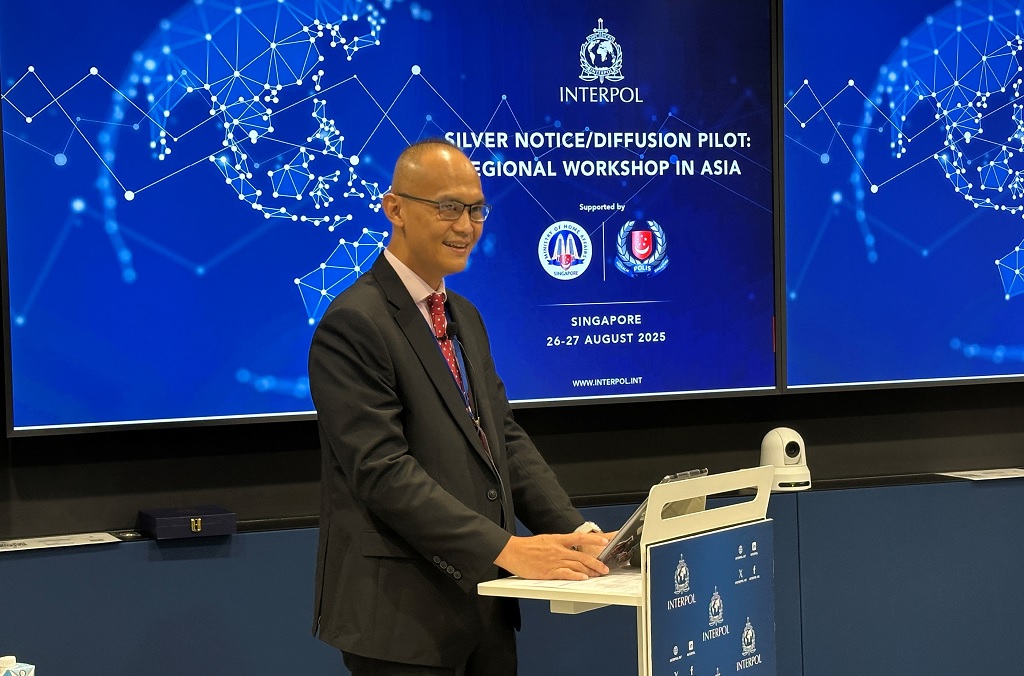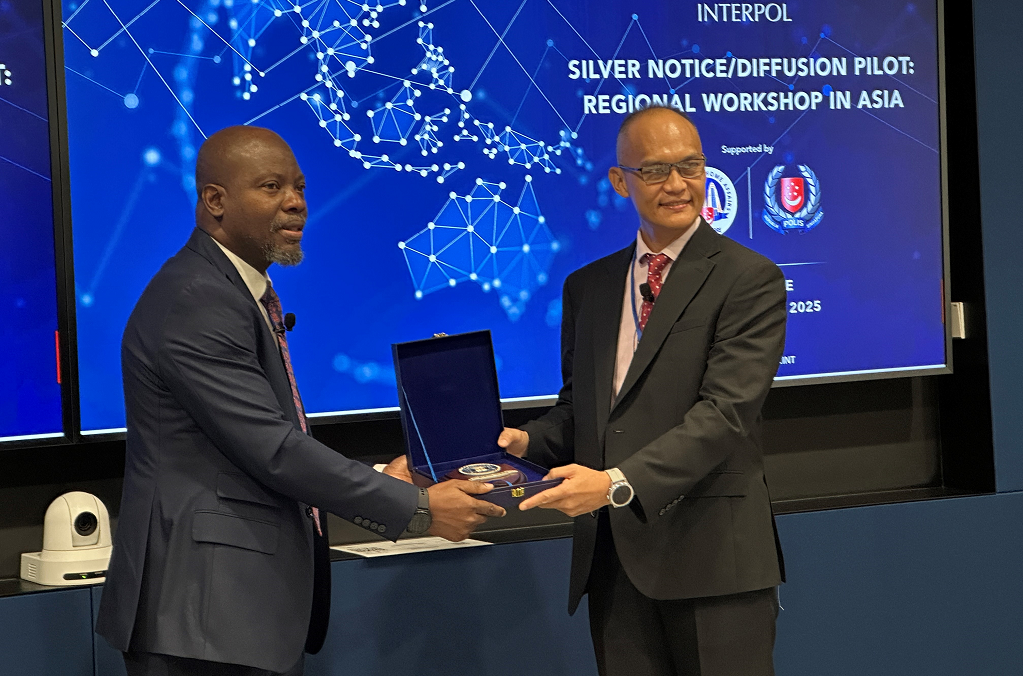SINGAPORE – Boosting recovery of illicit assets requires two factors: stronger cross-border cooperation and smarter use of available tools, experts emphasized at a regional workshop in Singapore.
The two-day workshop (held on 26 – 27 August 2025) is the last of a series of regional workshops by INTERPOL to familiarize law enforcement agencies with the use of the Silver Notice, following similar sessions held in Africa, the Americas and Europe, and was supported by Singapore’s Ministry of Home Affairs (MHA) and the Singapore Police Force (SPF).
21 participants from nine Asia-Pacific countries, including representatives from national police forces, financial intelligence units, judicial authorities and asset recovery specialists, attended the workshop.
Launched in January 2025, the Silver Notice provides countries with an additional tool to effectively identify, trace and seize illicit assets that enable criminal networks to operate and expand. It facilitates cross-border intelligence exchange and can lay the groundwork for subsequent requests for asset seizure or confiscation under national legal frameworks.
Covering 51 countries in its pilot phase, the Silver Notice is one of several tools—alongside the I-GRIP stop-payment mechanism—which empower agencies to move swiftly against illicit finances and fraud.
Money laundering as a growing threat
Rapid economic growth, increasing interconnectedness of economies, coupled with the widespread adoption of digital currencies and decentralized finance, have heightened money laundering threats in the Asia-Pacific.
Criminal groups operating in the region are increasingly laundering proceeds from arms dealing, corruption, cryptocurrency fraud, illegal mining, narcotics and scams through complex financial structures spanning across borders.
Globally, asset recovery rates remain low with only a small fraction of criminal assets seized or frozen.
Theos Badege, Director pro tempore of INTERPOL’s Financial Crime and Anti-Corruption Centre said:
“Depriving criminals and criminal organizations of their illegal proceeds is a globally recognized best practice in combatting transnational organized crime. INTERPOL is positioned to coordinate the global fight against money laundering, with the Silver Notice a valuable tool to support cross-border financial investigations and in turn, move the needle in asset recovery rates.”
Gregory Foo, Director of International Organisations and Security at MHA’s International Cooperation and Partnerships Division said:
“By recovering more illicit funds and improving global asset recovery rates, we will further enhance effectiveness in our fight against transnational financial crime. Countries need to join this collective effort to improve global asset recovery outcomes and stop the flow of illicit funds by making use of mechanisms like the Silver Notice to enhance international cooperation across the global law enforcement community.”
Senior Assistant Commissioner of Police William Koh, Director of SPF’s International Cooperation Department and concurrent Head of INTERPOL’s National Central Bureau in Singapore said:
“Transnational financial crime is a complex and evolving challenge that often manifests in a hybrid and borderless form, even more so in our highly digitalized world. It is not just necessary, but critical, for a coordinated and more unified global response to mitigate this scourge. The INTERPOL Silver Notice can enable this by sharing timely intelligence amongst the 196 INTERPOL member countries on illicit asset flows to facilitate asset recovery. Only by working together can we effectively disrupt and weaken transnational criminal networks. The SPF is pleased to co-organize this regional workshop with INTERPOL and MHA to strengthen international cooperation against transnational crime.”
Optimizing the use of Silver Notices
During the workshop, interactive table-top exercises and country case presentations encouraged participants to identify best practices and simulate the practical use of Silver Notices in ongoing cases.
Discussions also covered legal frameworks as well as operational and implementation challenges, offering a platform for collaboration and shared learning.
In addition to the Silver Notice, participants were encouraged to leverage INTERPOL’s other capabilities to conduct financial investigations and disrupt criminal economies. These include colour-coded Notices, databases, expert networks, and operational support tools.
This initiative builds on existing efforts by INTERPOL to facilitate international cooperation on asset recovery, including engagements with member countries, the Financial Action Task Force (FATF) and the UN Office on Drugs and Crime (UNODC).
The following countries and territories are participating in the pilot phase of the Silver Notice: Algeria, Argentina, Australia, Belgium, Brazil, Burundi, China, Colombia, Congo, Ecuador, Estonia, France, Gabon, Georgia, Gibraltar (UK), Guinea, Hungary, India, Iraq, Italy, Kazakhstan, Kenya, Korea (Rep. of), Kuwait, Latvia, Malawi, Malta, Moldova, Mozambique, Namibia, Netherlands, New Zealand, Nigeria, North Macedonia, Pakistan, Paraguay, Poland, Portugal, Qatar, Russia, Singapore, Spain, Sweden, Trinidad & Tobago, Ukraine, United Arab Emirates, United Kingdom, United States, Uruguay, Venezuela, Zambia, Zimbabwe.








